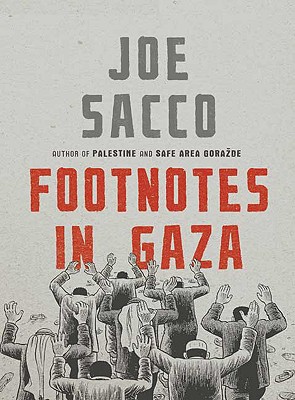My post on Joe Sacco’s Footnotes in Gaza, and my skepticism about comics journalism, prompted several interesting responses from Ethan. I thought I’d highlight them below.
I can recall at least one specific, focused example Sacco has given in numerous interviews as to what benefit he sees in using comics: he can present environmental or visual details unobtrusively or repetitively in a way that other mediums cannot. He has spoke about how his drawings of the West Bank allow him to depict, for example, the ubiquitous presence of children and of mud without having to repeat at the end of every sentence “and the ground was muddy and there were kids everywhere.” You feel that impact through background drawings. On the other hand, were this a documentary, he would be entirely dependent on stock footage or b-roll of contemporary Gaza– and I imagine stock footage of 1956 Gaza is hard to come by, if it exists. Thus he is able to give his narrative much more visual impact than the “talking heads” would of a documentary. Plus, of course, he gains the ease of access and portability that a book has over a documentary, as well as the length and depth of the book (this documentary would be hours long if all the dialogue was read out loud). These are all relatively superficial advantages comics has. I’m sure you could come up with more.
Other reasons: Sacco has said he appreciates the necessary slowness of comics, which requires abandoning any sense of timeliness in favor of “slow journalism.” Carrying a sketchbook and pencil into a strange location is much less obtrusive and alienating (and much cheaper) than carrying expensive camera equipment. People react very differently when you put a camera on them.
“He was doing comics for years when almost nobody cared” — reminds me of more good reasons. Comics, especially when Sacco started, used to fly so far under the critical radar of wider society that you could get away with doing a book about Palestinians without any pushback, or, y’know, attention. On the other hand, the novelty of “Hey, it’s a comic about Palestine” probably got him a lot of readers and attention that he wouldn’t have gotten from (yet another) book or documentary. I mean, Edward Said wrote the introduction to the collected ‘Palestine’ volume.

